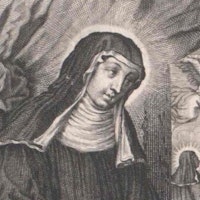It is the love of God that flows through all creation… Humanity is called to participate in this love by caring for the earth and all its creatures.
It is the love of God that flows through all creation… Humanity is called to participate in this love by caring for the earth and all its creatures.
Hildegard of Bingen

To Participate in This Love
Theme: Love
The greening power of the earth is the viriditas, which is the living light of the Holy Spirit. It is the love of God that flows through all creation, bringing forth new life and growth. Humanity is called to participate in this love by caring for the earth and all its creatures. The earth is a living being, and it is sustained by the viriditas. When we care for the earth, we are caring for the viriditas, and we are participating in the love of God. We are also caring for ourselves, because we are part of the earth. When we destroy the earth, we destroy ourselves
Hildegard of Bingen (1098-1179) was a Benedictine abbess and mystic of medieval Germany. She was born into a noble family in Bermersheim vor der Höhe, Germany, and entered religious life at the age of eight. She received a rudimentary education, but at the age of forty-two, she began to experience a series of visions that would shape her life and work.
Hildegard described these visions as "the living light," and they were often accompanied by physical sensations such as heat, cold, and pain. She believed that these visions were a gift from God, and she felt called to share them with the world. She began to write down her visions, and she also composed music and poetry to express her spiritual insights.
Hildegard was a prolific writer, and her works cover a wide range of topics, including theology, natural science, medicine, and music. She is best known for her three volumes of visionary theology: Scivias, Liber Vitae Meritorum, and Liber Divinorum Operum. These works are rich in symbolism and imagery, and they offer a unique perspective on the nature of God, the human soul, and the world.
In addition to her writings, Hildegard was also a gifted musician and composer. She wrote over 70 songs, including the Ordo Virtutum, an early example of liturgical drama. Her music is characterized by its simple melodies and its use of plainchant.
Hildegard was a complex and multifaceted figure, and her work continues to inspire and challenge people today. She was a visionary, a mystic, a writer, a composer, a scientist, and a healer. She was also a woman of great courage and determination, and she used her gifts to make a difference in the world.
Hildegard of Bingen was a remarkable woman who left a lasting legacy. She was a pioneer in the fields of theology, natural science, and music, and her work continues to be studied and appreciated today. She was also a powerful voice for women's rights, and she challenged the patriarchal structures of her time. Hildegard of Bingen was a true visionary, and she continues to inspire us with her courage, her intellect, and her creativity.
Scivias
Hildegard of Bingen. "Vision 3, Part 1." Scivias. Translated by Bruce Hozeski and Jane Bishop. Paulist Press, 1990, pp. 62-63.

Hildegard of Bingen
Theme: Love

About This Hildegard of Bingen Quotation [Commentary]
Hildegard of Bingen’s words, “It is the love of God that flows through all creation… Humanity is called to participate in this love by caring for the earth and all its creatures,” reflect her understanding that divine love is not distant or abstract but is actively present in the world. She names this presence viriditas, “the greening power of the earth,” which she describes as “the living light of the Holy Spirit.” This love brings forth “new life and growth,” not only in nature but within all that exists. For Hildegard, this divine energy flows through creation itself, making care for the world an act of spiritual alignment.
This alignment is expressed in how humanity is “called to participate in this love” through acts of care. Hildegard writes, “The earth is a living being, and it is sustained by the viriditas.” To care for the earth is to care for that divine life force, and therefore to take part in “the love of God.” Her words draw a direct connection between reverence for nature and spiritual responsibility. “When we care for the earth,” she writes, “we are caring for the viriditas, and we are participating in the love of God.” This relationship is not separate from the human self; rather, “we are also caring for ourselves, because we are part of the earth.”
Hildegard’s vision includes a warning: “When we destroy the earth, we destroy ourselves.” Her understanding of divine love includes mutuality—humanity depends on the earth just as the earth depends on human care. The vitality of creation is sustained when people live in recognition of this shared participation. Her teaching invites us to see divine love not only in spiritual contemplation but in concrete acts that honor the life around us. Through caring for the earth and its creatures, humanity steps into the current of love that “flows through all creation.”
Hildegard’s vision of the viriditas
Hildegard of Bingen’s vision of the viriditas is a powerful and inspiring one. It can help us to see the earth in a new light and to appreciate its beauty and its importance. The viriditas is also a call to action. It challenges us to care for the earth and all its creatures. It is also a reminder of our interconnectedness. We are all part of the same living being, and we all have a role to play in its well-being. Lastly, it can also help us to understand our own place in the world and our responsibility to care for it.
Commentary from Richard Rohr [Excerpt]
Hildegard spoke often of viriditas, the greening of things from within, analogous to what we now call photosynthesis. She saw that there was a readiness in plants to receive the sun and to transform its light and warmth into energy and life. She recognized that there is an inherent connection between the Divine Presence and the physical world. This Creator-to-created connection translates into inner energy that is the soul and seed of every thing, an inner voice calling us to “become who you are; become all that you are.” This is our life wish or “whole-making instinct.” [Richard Rohr, Viriditas: The Greening of Things, Monday, August 3, 2020.]
Additional Hildegard of Bingen Quotes
Resources
Related Quotes
Copyright © 2017 – 2026 LuminaryQuotes.com About Us